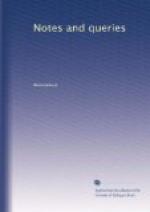We have entered at some length upon this Plan of a Church-History Society, and have quoted largely from DR. MAITLAND’s pamphlet, because we believe the subject to be one likely to interest a large body of our readers, who might otherwise not have their attention called to a proposal calculated to advance one of the most important branches of historical learning.
* * * * *
BURNET AS A HISTORIAN.
The following extract from Charles Lamb ought to be added to the testimonia already given by “NOTES AND QUERIES” (Vol. i., pp. 40. 181. 341. 493.):—
“Burnet’s Own Times.—Did you ever read that garrulous, pleasant history? He tells his story like an old man past political service, bragging to his sons on winter evenings of the part he took in public transactions when his ’old cap was new.’ Full of scandal, which all true history is. So palliative; but all the stark wickedness that actually gives the momentum to national actors. Quite the prattle of age and outlived importance. Truth and sincerity staring out upon you perpetually in alto relievo. Himself a party-man, he makes you a party-man. None of the cursed philosophical Humeian indifference, ‘so cold and unnatural and inhuman.’ None of the cursed Gibbonian fine writing, so fine and composite. None of Dr. Robertson’s periods with three members. None of Mr. Roscoe’s sage remarks, all so apposite and coming in so clever, lest the reader should have had the trouble of drawing an inference. Burnet’s good old prattle I can bring present to my mind; I can make the Revolution present to me.”—Charles Lamb: Letters.
GUSTAVE MASSON.
Hadley, near Barnet.
Bishop Burnet.—An Epigram on the Reverend Mr. Lawrence Eachard’s and Bishop Gilbert Burnet’s Histories. By MR. MATTHEW GREEN, of the Custom-House.
“Gil’s History appears to
me
Political anatomy,
A case of skeletons well done,
And malefactors every one.
His sharp and strong incision pen,
Historically cuts up men,
And does with lucid skill impart
Their inward ails of head and heart.
Lawrence proceeds another way,
And well-dressed figures does display:
His characters are all in flesh,
Their hands are fair, their faces fresh;
And from his sweet’ning art derive
A better scent than when alive;
He wax-work made to please the sons,
Whose fathers were Gil’s skeletons.”




